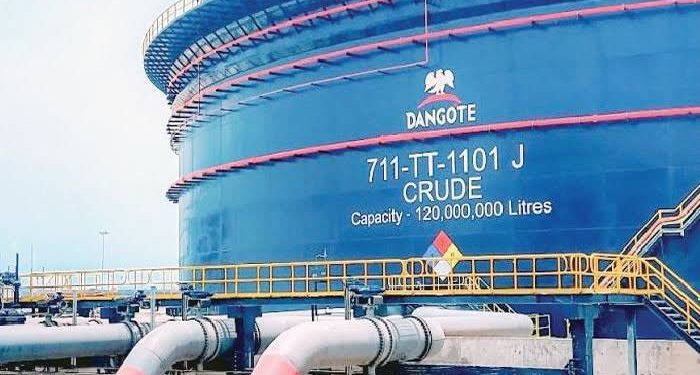Nigeria’s crude oil exports to the United States climbed to their highest level in nearly six years, reaching 364,000 barrels per day in May 2025. This surge follows a drop in domestic fuel production by the Dangote Petroleum Refinery, which has been operating below full capacity due to recent operational challenges.
According to data from the US Energy Information Administration cited by Reuters, crude imports from Nigeria rose from 358,000 barrels per day to 364,000 barrels per day. The spike coincided with an unplanned shutdown of the 650,000 barrels-per-day Dangote refinery between April 7 and May 11, pushing the US to increase imports from Nigeria to meet demand.
The report also noted that US crude and fuel inventories dropped during the week ending May 23, with crude stockpiles falling by 2.8 million barrels to 440.4 million barrels. This was contrary to analysts’ expectations of a modest 118,000-barrel increase. At the same time, US crude exports jumped by 794,000 barrels per day to 4.3 million barrels per day, contributing to the inventory drawdown.
Although oil prices saw a slight boost due to the unexpected drop in inventories, they remained in negative territory overall.
Meanwhile, Nigeria’s Dangote refinery, which began producing diesel and jet fuel in January and petrol in September 2024, is still operating below its potential. The refinery’s key gasoline-producing unit—the 204,000 bpd Residual Fluid Catalytic Cracking (RFCC) unit—has been running below capacity following a series of mechanical issues. The unit was taken offline between April 7 and May 11 due to damage and shut down again from May 15 to May 25. While refinery officials denied reports of complete shutdowns, they acknowledged ongoing adjustments.
With downstream units like the sulfuric acid alkylation unit and the polypropylene unit yet to begin commercial operations, the plant’s output remains limited. The alkylation unit is expected to launch by mid-June, and the polypropylene unit by the end of June. Currently, the refinery’s crude processing unit is operating at about 85 percent of its intended capacity, falling short of the target to reach full output before June.
The Dangote refinery, Africa’s largest, was anticipated to significantly shift global fuel flows and pressure smaller, less efficient refineries in Europe and other regions. However, delays in ramping up full operations have temporarily eased that impact while increasing Nigeria’s crude availability for export.










